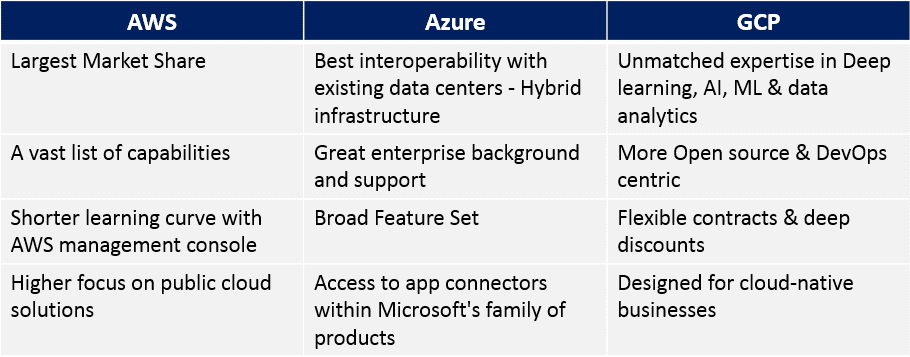Combining Big Data & Cloud for business transformation
Reading Time: 4 minutes

Even after its introduction to the world in the 1970s by IBM, “cloud” was still a term used more by weatherman than IT and system engineers. All that changed in 2006 when Google CEO Eric Schmidt introduced the term “cloud computing” at an industry conference. Since then big data on cloud has been largely explored by companies to bring scalability and functionality to their workings.
How was life before the advent of cloud platforms?
Most large businesses in the past built, ran and managed their own server farms to extract value out of massive data. This old school approach no longer makes economic sense for any organization that is serious about achieving business goals using complex Machine Learning and AI Algorithms on massive data sets.
With increasing reliance on data to provide answers for more and more Business cases, organizations today try to fulfill the demands made by data itself, with the best possible infrastructure. As data grows, so do the systems & processes that are required to manage it. Just to give you an idea, IDC(International Data Corporation) predicts that by 2020, 50% of all business analytics software will incorporate prescriptive analytics built on cognitive computing technology, and the amount of high-value data will double, making 60% of information delivered to decision makers actionable. This is where the cloud comes in or rather data goes to. Big data on cloud resonates more with businesses to match the scale of data.
Since cloud platforms are the way forward, it’s best to understand and appreciate how impactful migrating your on-premise infrastructure onto a cloud is. Here are the top 5 reasons why you should consider migrating to a cloud platform or continue to evaluate the best options in the market if you’re already on it.
- Lower TCO
Cloud’s IaaS (infrastructure –as – a service) model allows companies to eliminate the high cost of on-premise infrastructure and turns it into operating expenditure. No upfront investments are needed to set up data servers or warehouses in anticipation of a future need.
- Reduction in payment with time
Yes, you read that right. So what happens in cloud computing is that cloud resources are shared by many other companies. As more companies get on the cloud, which they are, amortization kicks in distributing the costs among all users and the amount you spend on your cloud services keep reducing!
-
Higher Uptime
The best IT guys find it hard to provide server uptime and reliability that most large cloud providers can, which is mostly upwards of 99.9%. On top of this, they back it with credits if the monthly uptime drops below a certain threshold.
- Increased Scalability
Large volumes of data require high processing power and storage. Cloud is best to swiftly adapt to changing volumes of data so that sudden spikes in data size or processing requirements are efficiently managed.
- Increasing Data Security
If you think this is one of the challenges that prevent you from hosting your company’s data on the cloud, read on. Cloud computing providers are facing competition from their rivals and differentiating on the basis of data security gives one player a certain edge over the others. This is because they are responsible for large volumes of critical customer data and have a lot in stake if a security breach occurs. So their security experts are abreast of the latest security standards such as HIPAA, PCI, ISO, Sarbanes-Oxley, and many more.
Apart from the advantages mentioned above, there are many more benefits of the cloud such as better disaster recovery, ease of automation, impact on the environment, flexibility in usage, etc. The list goes on.
So who are the key players?
AWS – Amazon Web Services, Microsoft’s Azure & GCP – Google Cloud Platform are in contention in a fierce leadership race.

Other cloud services in contention are IBM cloud, VMware Cloud on AWS, Oracle big data cloud, and Alibaba cloud. Now that you’ve had a glimpse of what cloud can bring to your business, its best to seek help from an expert to make sure you realize all the benefits that were listed and more and most importantly to choose a platform that is right for your business context.
About the Author
Sudeep is a Senior Pre-Sales Manager at Sigmoid. He has a decade of experience in providing Data driven solutions for companies across AdTech, Retail & CPG in their digital transformation journey.
Featured blogs
Subscribe to get latest insights
Talk to our experts
Get the best ROI with Sigmoid’s services in data engineering and AI
Featured blogs
Talk to our experts
Get the best ROI with Sigmoid’s services in data engineering and AI






